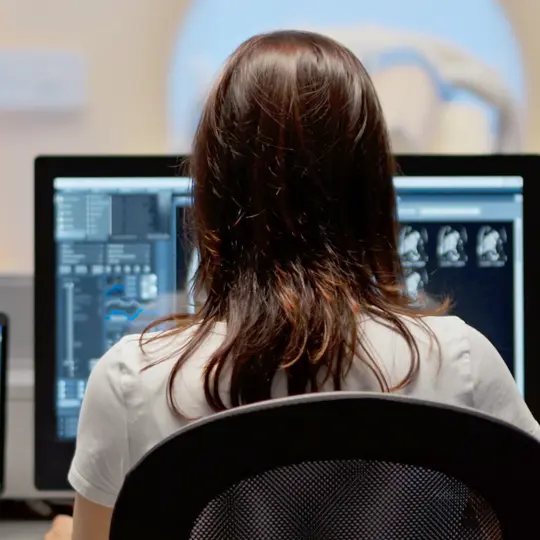1 of 10 / Overview
View All
What Is Multiple Sclerosis (MS)?
MS is a disease that can affect your brain and spinal cord, and can cause problems with vision, balance, muscle control.
Frequently Asked Questions About MS
We answer some of the most common questions about multiple sclerosis.
Myths and Facts About Multiple Sclerosis
It's easy these days to pick up wrong-headed ideas about how to manage your multiple sclerosis (MS). So take a few minutes now to sort out fact from fiction.
MS and Your Immune System
MS is a disease that stems from your immune system’s overreaction and that it attacks your own body.
2 of 10 / Types
View All
What Are the Different Types of MS?
Doctors have identified a few major types of MS. The categories are important, because they help predict how severe the disease can be and how well treatment will work.
Relapsing-Remitting Multiple Sclerosis
Most people with multiple sclerosis (MS) have a type called relapsing-remitting MS (RRMS). It usually starts in your 20s or 30s.
Myths and Facts About Relapsing-Remitting MS
Make sure you get the facts and stay clear of the many myths that surround the disease.
Early Treatment for Relapsing-Remitting MS
Research suggests that sooner is better with RRMS treatment. One study shows that people who began treatment as soon as their first symptoms started were 35% less likely to have a repeat attack.
3 of 10 / Symptoms
View All
Multiple Sclerosis (MS) Symptoms & Early Warning Signs
How and when symptoms like vision trouble and numbness and tingling are commonly seen.
Multiple Sclerosis and Vision Problems
Vision problems are pretty common for people with MS. The symptoms usually come and go on their own.
Optic Neuritis: How MS Can Affect Your Vision
How MS cam affect the optic nerve and cause vision trouble.
What Is the Uhthoff Phenomenon?
Uhthoff’s phenomenon is most commonly a symptom of multiple sclerosis (MS), though it can also coincide with other optic nerve disorders.
4 of 10 / Causes & Risks
View All
Possible Causes of Multiple Sclerosis
Doctors still don't understand exactly what causes multiple sclerosis. But ongoing research shows many reasons could be at play, including your genes, where you live, and even the air you breathe.
Your Genes and Multiple Sclerosis (MS)
In basic terms, scientists simply don’t know what causes multiple sclerosis, or MS. Your genes play at least some part.
Epstein-Barr Virus and MS: What’s the Link?
MS doesn’t have a cure, but scientists are one step closer to figuring out what triggers it. Strong evidence shows that viruses can trigger the process, especially Epstein-Barr virus (EBV).
MS and Diabetes: What to Know
Multiple sclerosis and diabetes are connected – first, because they share some of the same symptoms, and second, because some research suggests they might have some of the same causes.
5 of 10 / Tests & Diagnosis
View All
How Multiple Sclerosis Is Diagnosed
It can be a challenge for doctors to diagnose multiple sclerosis (MS). There’s no single test that can prove you have it. And many conditions have symptoms that seem like those of MS.
Diagnosing Multiple Sclerosis With MRI
MRI is a diagnostic test that detects changes in the brain related to MS.
The Spinal Tap and MS
Liquid taken from a spinal tap is a procedure that can indicate brain-related trouble from MS.
Evoked Potential Tests for MS
Evoked potential tests measure electrical activity in the brain caused by light, sound, and touch.
6 of 10 / Treatment
View AllTreatments for Multiple Sclerosis
Athough there's not yet a cure for MS, there are many effective medications to help you manage the disease. Here's a rundown of your treatment options.
MS Medication Options
These are drugs that have been shown to slow the progression of MS.
Induction and Escalation Therapies for MS
There are two ways doctors usually approach treatment, depending on the nature of a person’s MS. These are induction therapy and escalation therapy.
Surgeries and Procedures for MS
If medication doesn’t work or has side effects you can’t tolerate, your doctor might suggest surgery or another procedure.
7 of 10 / Living With
View AllTips for Living With MS
A long-lasting condition like multiple sclerosis can affect your life in many ways.
Self-Care for MS Symptoms
There’s no at-home remedy for MS. But there are things you can do to feel better and ease your symptoms.
Colds and Flu When You Have MS
A cold or flu is no fun for anyone, but if you have multiple sclerosis (MS), it can mean extra trouble.
Can I Get Vaccines if I Have MS?
Years ago, people worried that some vaccines, like those that prevent hepatitis B, caused MS. Many studies showed that this wasn’t true. Yet some shots may trigger an infection that causes you to relapse.
8 of 10 / Mobility & Assistive Devices
View AllAssistive Devices for MS
Assistive devices are tools that can make life with multiple sclerosis a little easier. They help you with tasks like walking, dressing, and bathing, and help you use less energy.
Assistive Technology for MS
Many gadgets and technology solutions are on the market that can help people with multiple sclerosis (MS) keep independence in their homes.
Make Your Home Work for You When You Have MS
Multiple sclerosis can change how well you can move around and get things done. So you may have to tweak how you do your daily tasks to make them a little easier.
Home Safety When You Have MS
If your multiple sclerosis (MS) symptoms are making it hard for you to move around, it may be time to make a few changes to your home.
9 of 10 / Complications
View AllComplications From Multiple Sclerosis
You can develop complications along with your multiple sclerosis. They can range from mild to severe.
Conditions You May Have Along With MS
If you have multiple sclerosis, you're more likely to also have certain other medical conditions, including depression, high blood pressure, and lung disease.
How MS Affects the Brain
Over time, about half of people with MS can have some cognitive problems. That means poor focus, slowed thinking, or a fuzzy memory.
How MS Affects the Cerebellum
Commonly, MS can affect a part of your brain called the cerebellum. Damage here can leave you with a wide range of symptoms, including shakiness, coordination problems, slurred speech, or trouble with certain higher-thinking skills.
10 of 10 / Caregiving & Support
View AllMultiple Sclerosis Resources
Here are a variety of resources available to help you and your family meet the challenges of MS.
WebMD Multiple Sclerosis (MS) Facebook Group
Connect with others who have MS or are caring for someone with the disease.
How to Get Help for Multiple Sclerosis
Multiple sclerosis (MS) is a lifelong disease that can get worse over time. As your symptoms grow more severe, you may need a hand to manage your condition.
Finding Help for Multiple Sclerosis
Connect with others who hae MS -- share your story, tips, and offer support in our online community.
Suggested Reads about Multiple Sclerosis
Tips to Manage MS Fatigue
About 4 out of 5 people with MS deal with fatigue as a symptom. Learn tools and tricks for managing your energy.
Scientists May Understand Link Between Common Virus & MS
Researchers believe antibodies against the common Epstein-Barr virus can damage the nervous system and cause severe MS symptoms MS, including problems with balance, mobility and fatigue.
Treatment May Delay MS Symptoms in People at High Risk: Study
Researchers have identified a treatment that could delay the symptoms of multiple sclerosis, which could be helpful for people who have brain imaging that uncovers early signs of the debilitating disease.
MS Questionnaire Helps Measure Symptoms and Spot Early Disease Changes
Your MS Questionnaire is a user-friendly quiz that patients take to help their doctors understand their medical history.
Popular Topics in Multiple Sclerosis
8 million+ Physician Ratings & Reviews
Find Doctors and Dentists Near You
You can also search by physician, practice, or hospital name
Find your WebMD Facebook community to learn, share and connect.
Multiple Sclerosis Support
For anyone living with multiple sclerosis, as well as caregivers and loved ones, here is an opportunity to connect with others and find out about the latest advancement in MS research, treatment and management. This private group is curated by health professionals you can trust.
Join Group on Facebook
